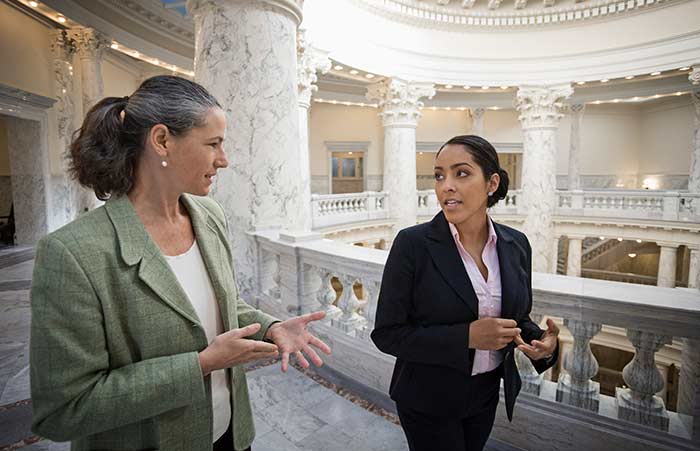
The DCAA preaward audit approves your organization for work with Department of Defense and intelligence agencies. Here’s what you can expect before, during, and afte...
To be a government contractor, your organization’s accounting system must be structured to comply with Federal Acquisition Regulations (FAR). A preaward audit determines if your system is acceptable (i.e., it has the ability to segregate direct and indirect costs and identify them to the appropriate cost objectives, such as contracts or indirect cost codes) prior to the final award of a contract. It’s critical that your organization’s accounting system is approved so that you are certified as such when submitting bids and proposals — and knowing what to expect in a preaward audit will help you better prepare for it.
Who conducts a preaward audit
For government contractors pursuing work with the Department of Defense or intelligence agencies, the preaward audit will most likely be conducted by the Defense Audit Contract Agency (DCAA). But other agencies and public accounting firms, when authorized, can perform it.
What to expect prior to a DCAA preaward audit
The DCAA preaward audit is initiated by a letter to the contractor (your organization). The letter states the name of the contracting officer requesting the audit and describes the purpose of the audit and the process. After the letter is sent, an auditor will schedule an onsite visit, referred to as fieldwork. The auditor will propose a date and time for the fieldwork, but it’s acceptable for you to request another date that is mutually agreed upon with the auditor.
The DCAA auditor will request information to assist in planning and fieldwork. The requested information may vary somewhat by auditor or region, but the initial inquiry typically asks for:
- Chart of accounts with account descriptions
- Written accounting and purchasing policies and procedures
- Timekeeping policy and procedures
- Financial statements and trail balance of the most recent closed year
- Year-to-date financial statements and trial balance for the most recent closed month
- Description of direct and indirect costs and expenses included in each cost pool and basis
The auditors will want to ensure that your management team is aware of all applicable guidance, including FAR 31 Contract Cost Principles and Procedures and FAR’s provisions for allowability of costs; proper classification for both direct and indirect costs and unallowable costs; and application of the cost principles for all contract types, including cost reimbursable, fixed price, and time and materials.
Your organization will need to show that you have implemented internal controls to ensure unallowable costs are identified and excluded from billings. Unallowable costs are certain business expenses which cannot be recaptured in rates billed to the government. As the contractor, you are responsible for establishing and maintaining an acceptable system design for accumulating costs under federal contracts. Key requirements of an acceptable system are listed in the SF 1408, and they include the segregation of direct, indirect, and unallowable costs, a timekeeping system with job codes and an approval flow, and an accounting close cycle that occurs at least monthly.
The auditors will also want to know which accounting system software your organization uses. It’s important to understand there is no specific accounting or timekeeping software that is considered acceptable or unacceptable. Instead, the auditors will consider how you have configured the software of your choice and if the system and accounting processes that support it meet the control objectives and the requirements outlined in the SF 1408.
What to expect during the DCAA preaward audit
Fieldwork generally lasts one to two days. While onsite, the auditors will ask to see various system reports. They will sample an employee’s timesheet and request a walkthrough of the time recorded, the approval of the timesheet, and a demonstration of how timesheet data is transmitted or otherwise posted into the accounting system. They will also want to see how the cost of that time is captured in the job cost reports as well as the general ledger.
During fieldwork, the auditors will ask about the costs and cost basis for indirect cost rates, such as fringe benefits, overhead and general and administrative rates, and how your organization is ensuring that unallowable costs are excluded from rates.
Expect additional data requests during fieldwork, such as:
- Labor distribution report for the most recently completed and recorded payroll period
- Job cost ledger by task for the period that includes the most recently completed and recorded payroll period
- Computation of current indirect rates and for the prior two fiscal years showing the makeup of all cost pools and bases
- Recent invoices that can be traced through the accounting system
You should be prepared to discuss controls on contract management and percentage of completion tracking (e.g., how cumulative billings are monitored against contract values to ensure contracts are not overrun and the government is not overbilled).
Upon completion of fieldwork, the auditors will likely follow up with additional questions or requests for data or reports.
When you will receive the preaward audit result
The auditor’s determination of an acceptable system is made within a few weeks of fieldwork. You can request an audit exit conference, which is typically done via a phone call. The exit conference is generally very brief, and the auditors will inform you of the findings and whether or not your system has been determined to be acceptable.
A report will be sent to the contracting officer who requested the audit. Once your system has been deemed acceptable, your organization can certify on any proposal or bid that you have an acceptable accounting system.
How we can help
Government contractors should understand the requirements for an acceptable accounting system and design their own with the appropriate controls from the very beginning. CLA’s government contractor-specialized professionals can help you implement proper structure and controls so that you are ready for a preaward audit and fit to work seamlessly with the governmental agencies you contract with.
